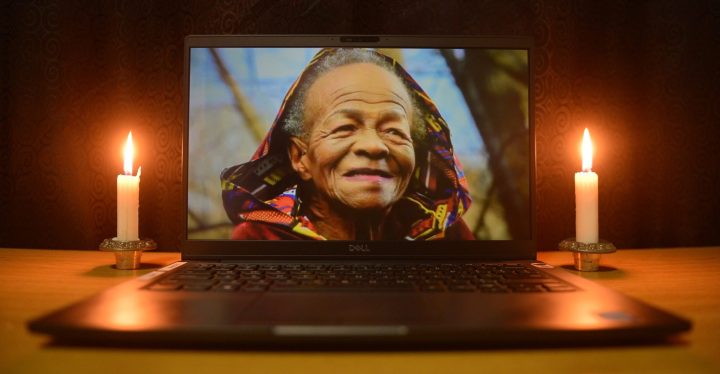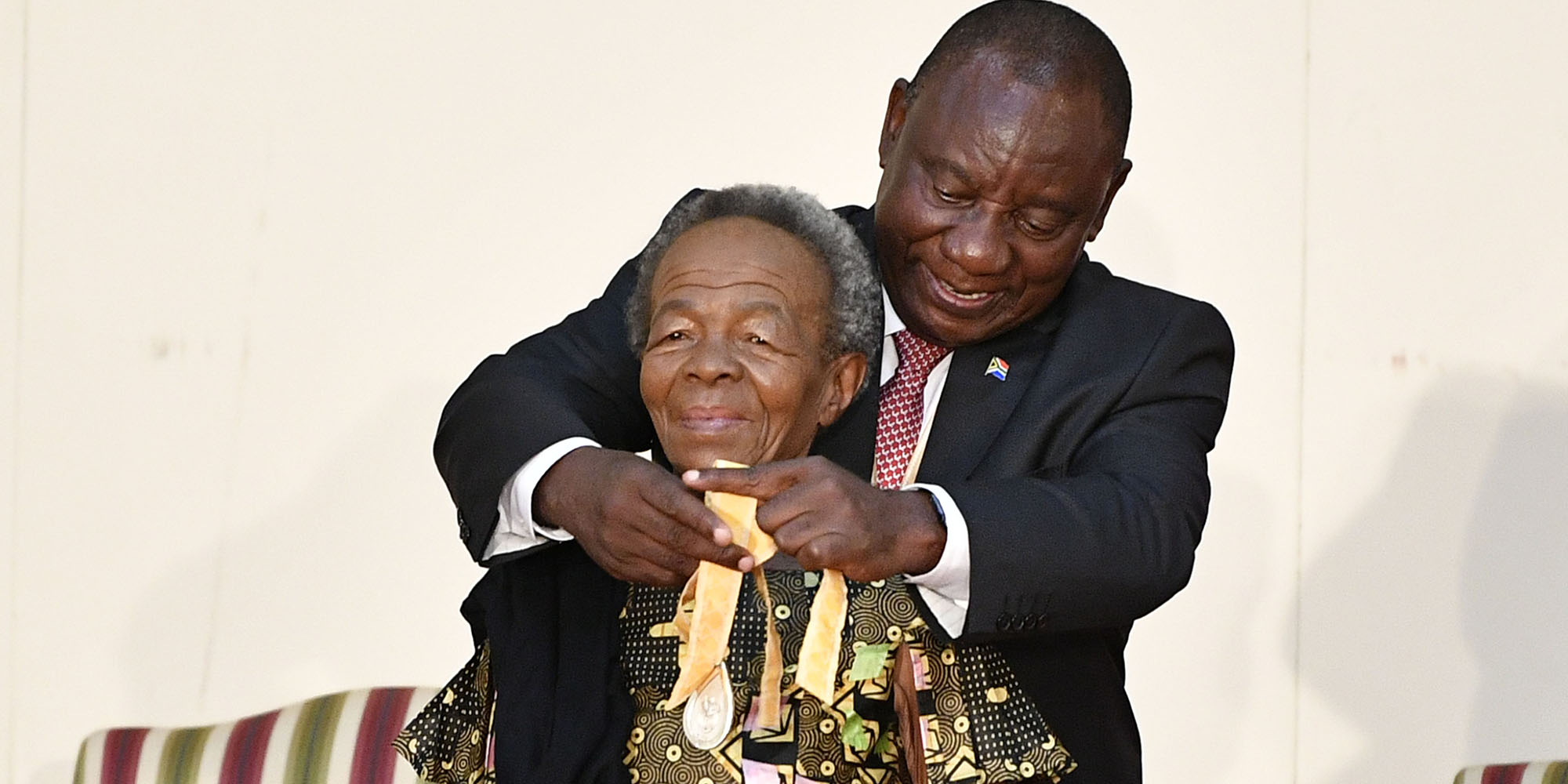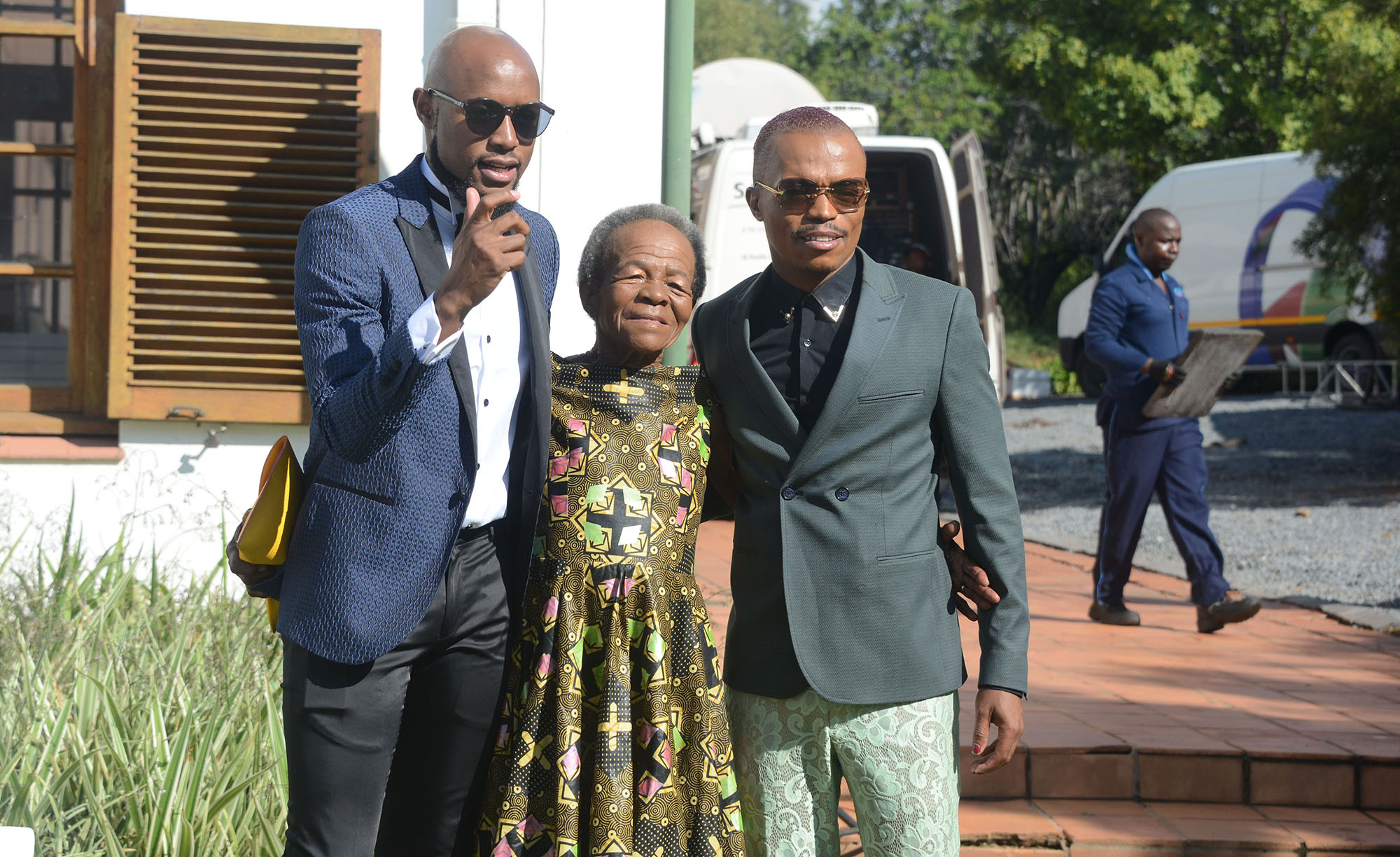Tribute: Mary Kuksie Twala (1940—2020)
Mary Twala: Thespian, shaper, institution, yet humble

Actress Mary Twala, who has died at the age of 79, has been described as an institution. A part of South Africa’s film and theatre industry for six decades, Twala was a prolific actress whose contribution helped shape the evolution of the performing arts industry in the country.
At her advanced age, it was remarkable that Mary Twala was still active. During an interview with the SABC in 2019, she indicated that she could play the role of a 16-year-old. It was not an empty boast.
Before she succumbed to health challenges, the industrious and resilient actress displayed the energy and exuberance of a teenager. And indeed the industry acknowledged her standing as an institution with a number of accolades.
In 2006 she was honoured with a Lifetime Achievement Award at the Naledi Theatre Awards for her peerless contribution to the performing arts. In 2018 she crowned that accolade with another Lifetime Achievement Award – this time bestowed by the Mbokodo Awards and dedicated to recognising exceptional accomplishments by South African women in various fields.

The Order of Ikhamanga in Silver be bestowed to Actress Mary Twala by President Cyril Ramaphosa during the 2019 National Orders Awards on April 25, 2019 in Pretoria, South Africa. (Photo: Gallo Images/Frennie Shivambu)
Born the eldest in a family of eight siblings in Orlando East, a township that later came to be known as a part of Soweto, the Twalas had very little but somehow managed to survive the grinding poverty of township life at the time. Elizabeth Twala, known as MaKhambule or MaKemp, was the matriarch of the family and everyone’s pillar of strength. Somizi Mhlongo would later describe his grandmother as his “queen”. They all lived in a four-roomed matchbox house.
“No one worked. My mother and father did showbiz work but that didn’t pay much. I don’t know what my granny was doing… whether she was a domestic worker in Noordgesig, the coloured township opposite Orlando East, I have no idea, but we survived,” he writes in his memoir.
It’s not clear whether her father was involved in her upbringing at some stage, but she had a father figure in an uncle known as Dan Twala. Originally from Swaziland, he was a community leader and patriarch of the Twala clan on the Reef.
There’s a picture of an adolescent Mary standing behind a seated Mr Twala with her eyes fixed on the cameraman. It was probably taken in the early fifties. His daughter, Shado Twala, remembers that their house, also in Orlando East, was home to everyone who bore their surname. They would be accommodated in those cramped conditions until they found their own homes. An illustrious cultural figure, Dan Twala was one of the first black actors to have starred in a film.
Jim Comes to Joburg (1949) was the original local movie with a majority African cast. The aim seemed to have been a genuine portrayal of black urban life under apartheid, although in retrospect it appears like a romanticised version of the harsh conditions experienced by Africans. The film introduced a 19-year-old beauty who sang like an angel. Her name was Dolly Rathebe, the future queen of the blues. Dan Twala was also a musician, footballer, broadcaster, sports administrator and impresario.
This multifaceted approach to the arts and sport was not unusual among his generation of those early pioneers of the arts, and their achievements certainly served as an inspiration to youngsters like Mary. Incidentally his youngest daughter and renowned radio personality, Shado Twala, was one of the women achievers who were honoured at the same Mbokodo Awards where Mary Twala’s sterling achievements were celebrated. The two were educated in Swaziland along with the children of royals, according to family tradition.
Mary started her education at local primary schools before being sent to Swaziland for her high school education. However, there were few opportunities for African girls in those years. On her return, she found a factory job as a seamstress but it seemed her heart was not into it. When her interest in singing caught the attention of playwright and talent scout, Gibson Kente, it marked the beginning of an illustrious showbiz journey.
She was already a famous stage luminary before marrying Ndaba Mhlongo, which explains why she had retained her maiden name. Her husband belonged to a generation of performers and comic actors whose unique brand of humour was never witnessed again. His characters spoke with a characteristic stutter that was mimicked by many aspiring thespians who have since either realised their dreams or fallen by the wayside.
He was popularly known as Mshefane, a legendary name that evoked awe among his admirers because it came straight from the movies in which he starred. A Durbanite, he came to Johannesburg in the early sixties with his sister and singer, Busi (Victoria) Mhlongo – and immediately joined Gibson Kente’s stable of actors. He was already married with two children, but an encounter with Mary changed everything. She would later remember him as a kind-hearted person and devoted husband who made her laugh a lot and enjoyed cooking for her.
The couple met in Dube, Soweto, during rehearsals for a Gibson Kente musical, Sikalo (1966). At that stage the man known as the father of township theatre had already penned Manana the Jazz Prophet (1963) and staged it at Wits University’s Great Hall under the auspices of Union Artists, a white-run theatre company based at Dorkay House and responsible for producing King Kong (1959). Their relationship didn’t last as Kente launched his own company, GK Productions. Sikalo was a play that would change the course of musicals and define a genre that has since become known as township theatre, and its sub-genre, protest theatre.
The music, a blend of jazz, gospel, the blues and folk, struck an instant chord with black folks across who crammed dingy community halls wherever Kente’s hit production was staged. The ensemble often featured some of the leading instrumentalists of the era – revered jazz figures like saxophonist Henry Sithole, guitarist Themba Mokoena and trombone player, Dugmore “Bra Darkie” Slinger. But the real stars of Kente’s shows were women singers, and the likes of Margaret Mcingana, Zakithi Dlamini, Betty Mthombeni, Snowy Gwabeni, Pat Mabuya and Jeanete Tsagane shone in this regard.
Well-known cabaret singers and actresses Abigail Kubeka and Marah Louw also had a stint in the Kente stable during those golden years of township theatre. Twala was usually cast in the lead and her stirring soprano has since become the signature voice in a Gibson Kente recording. In Sikalo, a play about a generation gap between father and son, she portrayed MaDlamini, a mother who is determined to protect her son, Sikalo (Kenny Majozi) against her hard-drinking and abusive husband, Mbatane (Ndaba Mhlongo).
The husband-and-wife roles would be replicated in future plays. And like her generation of Kente thespians, she worshipped the ground he walked on. In her eyes, he was a great self-made man who defied the odds to accomplish what no black man under apartheid could achieve.
Mary Twala and Ndaba Mhlongo subsequently became the best-loved showbiz couple, not only on Kente’s stage productions, but also in a number of township movies. It was the era of Simon Sabela Mabunu and the skop–skiet–en–donder movies that featured Ndaba Mhlongo – films such as uDeliwe, Inyakanyaka, Ikati Elimnyama and Ngaka. The titles came from the random violence in their storylines.
Mary Twala featured in small roles in these films that were essentially masculine in nature. They had married in the late sixties. Their fourth and last-born child, Somizi Buyani Mhlongo, was born on 23 December 1972. At the age of two, he was already touring the country with his parents in Gibson Kente plays.
It was the time of How Long? – a play that heralded the overtly protest posture in Kente’s works during a decade in which anti-apartheid politics were defined by Steve Biko’s black consciousness, a philosophy of mental liberation and assertiveness that sought not only to protest against the injustices of the day, but to confront them as well.
Therefore township theatre became a cultural weapon against political oppression and How Long? was a potent one in this regard, particularly in the way it handled the tyranny of the pass laws and the liquor raids against helpless township folks. As in other Kente musicals, the singing is memorable and theatre lovers praised Mary Twala and Zakithi Dlamini in particular for soul-stirring performances. The apartheid authorities noticed the play’s political influence and banned it, but Kente and his cast had made their point.
At six years old, Somizi made his debut stage appearance alongside his parents in a Paul Rapetsoa production titled Circumstances, a touching story about how a couple is reunited with their six-year-old boy they abandoned in infancy. On the contrary, the story of Mary Twala’s unconditional love for her gay son is well documented. It was a source of humorous banter between Twala and close friends such as fellow actress Lilian Dube, but its serious message of a mother’s unreserved devotion to her child was never lost.
Their special mother-and-son bond has been poignantly captured on Living the Dream with Somizi, a Mzansi Magic reality show on which she made regular guest appearances.

Somizi Mhlongo with his mother Mary Twala and his fiancee Mohale Motaung during the 2019 National Orders Awards on April 25, 2019 in Pretoria, South Africa. (Photo: Gallo Images/Frennie Shivambu)
In his memoir titled Dominoes: Unbreakable Spirit (2017), Somizi remembers his parents as inseparable friends who were in the habit of wearing clothes with matching colours, a devoted couple whose romance was exemplary to both peers and admirers. When Ndaba Mhlongo died on 25 October 1989, Mary’s world came to an end. It was also a great loss to the country as the comic actor was much loved in the industry. But to Mary he was everything. And it made sense when her son said he had made peace with her imminent demise because he hated to see her in such a lost and unhappy state of mind. Yet somehow she found the strength to continue.
Around that time she had appeared in Mapantsula (1988), an anti-apartheid film that poignantly captures the turbulent political situation in the eighties. Directed by Oliver Schmitz and starring the late Thomas Mogotlane, it was a groundbreaking production that told the story of apartheid and township struggles from the victims’ perspectives. Twala appears as one of the protesters during the rent boycott. Around this time she was so immersed in film and TV roles that theatre seemed like a distant memory.
One of her last theatre gigs with Kente was Mama and the Load (1980) where she acted alongside Mbongeni Ngema and Sello Maake Ka Ncube. But that was not the end of her stage life.
In 2008, playwright Duma Ndlovu cast her in The Game at the Playhouse, Durban. The following year she performed at the Market Theatre during the 20th anniversary of Sheila’s Day, another production by Duma Ndlovu that celebrates the spirit and resilience of black women in general and domestic workers in particular. Originally staged in 1989 at Crossroads Theatre, New Jersey, the joyous musical went on to touch audiences in playhouses and festivals around the world.
The dawn of democracy posed challenges for filmmakers and artists to create works that reflected a changing South African society. The storyline of Taxi to Soweto (1991) was conceptualised against this background. It’s a groundbreaking, classic movie that examines race relations in a polarised society that’s on the threshold of unprecedented social and political transformation. The character of Fedora – portrayed by Mary Twala – is more visible than most of her film roles, even recent ones. It earned her a top award in a best supporting actress category.
Fedora is a domestic worker in white suburbia but her assertive and irrepressible demeanour contradicts the stereotype of a submissive kitchen girl who knew her place in white society. With Elize Cawood, Patrick Shai, Marius Weyers and the late Ramolao Makhene, this South African classic brings together the best actors from both sides of the fence. It was released at a time when another local classic and international blockbuster, Sarafina!, was being filmed on the streets of Soweto. In the latter, she portrays a minor role of Sarafina’s unnamed grandmother. Her husband had been involved with the stage version of the production as a choreographer, a fact which explains Somizi’s innate ability in this field.
One of her latest TV works, Skwizas, is a sitcom that follows a group of elderly friends who spend the twilight of their lives in a retirement village. They have to grapple with life’s challenges, including lost careers, petty jealousies and the prospect of late-life romance. Lilian Dube remembers that on Skwizas she was allowed to be her age. She could fluff her lines but still manage to put on a sterling performance with hilarious results.
It was befitting that her last award was the Order of Ikhamanga in silver for the “versatility and longevity of her acting career, as well as her outstanding contribution to the arts in South Africa”.
Significantly, her passing was announced a day after her husband’s birthday. The timing has been interpreted by her son as a sign that it was time for her to join her husband and celebrate with him on his special day.
South Africans have remembered her as someone who brought much laughter in their lives – an unassuming personality with a deprecating sense of humour.
Humble to the end, Mary Twala never saw herself as a celebrity but she was most definitely an institution. DM

















 Become an Insider
Become an Insider